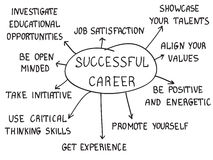|
Career Management
An effective career management consists of proper career planning, career selection, horizontal navigation, job retention, and consistent upward mobility. Many people like myself go through college and career management without much consideration for and attention to their deep desires and talents. When I selected accounting as my major in college, I never imagined my career path to be the one I’m in right now. At the time, I figured I’d get my accounting degree as quickly as possible, become a CPA and get a job. This was the extent of my career planning. Although, I was good with numbers and somewhat felt I can fit right into an accounting related career, I had no one to give me any sort of career advice. So, I followed my intuition and selected whatever college program I thought I could easily get into and finish as quickly as possible, which happened to be accounting for me. Although I have no regrets with regards to my own career path, how many people can you say are lucky enough to follow a career path that they enjoy? My guess is and based on my own observation of colleagues and friends, not too many are really satisfied with their career choices. Some people select their careers based on talent, interest, deep desires or intuition, family pressures, peer pressures, money motivation, selection ease and prestige. But, rarely are career choices based on true drivers that can deliver true happiness, best of the breed, confidence and satisfaction which I call Career Beacon. Career planning while still in early years of college or even high school is the most important period where parents, coaches, and friends can help the young with the identification of true career drivers. Career selection, which follows career planning, may sometimes require additional and deeper analysis of career drivers to identify a specific job within a planned career. Let me present my own experience to further explain what I mean. When I selected my accounting career, which ended up to be right career for me even without a formal or careful career planning, I never imagined at the time I’d get into auditing let alone information technology auditing or information security because I didn't even know they existed as career choices. However, I know now that excellent logic and analytics is an important driver for a successful career whether we are accounting for company finances, or assessing the risks facing the companies we work for. That being said, after planning for and selecting my accounting career while in college, I realized I liked auditing and my performance in the audit classes further proved to me that I could get really good at it and thus I selected internal auditing as my first professional career choice. The next three sections I would like to discuss are heavily dependent on corporate career politics. While career planning and selection are important parts of career management, horizontal career navigation, job retention and upward mobility are also part of our longer-term career management process that require knowledge of career politics. While job retention and upward career mobility are self explanatory, horizontal navigation requires alertness and flexibility. For example, you may be in a career path that is steady with little growth year after year, when you suddenly learn about a new related field that is fast expanding in need of professionals with some or all of your expertise. This is when you have to be alert, open minded and flexible for change. I call this horizontal career navigation because instead of going upward for career reward, you go sideward and still get rewarded because of the faster growth in the related career field. Career politics are simply defined as the right things that we learn to say and do as we move along the corporate path. Or, the wrong things that we should avoid saying or doing with one exception; don’t sacrifice your being. In other words, there are times that we have to confront lies, deceptions, and unethical behaviors even if sometimes the confrontations happen to be the “wrong” things to avoid doing or saying. As some say, you only have one life and this is it. There is no practice run. Maintain your integrity and pride at all times possible. Unfortunately, career politics are neither taught in schools nor businesses and college graduates enter the corporate workforce with little or no knowledge of best corporate behaviors. I remember, a few times in my early days of corporate experience, I tended to ask for permission to leave the office at the end of the day while others who were more experienced just left the office when it was time to leave. This sounds funny to me now but I would not laugh if one of my new college recruits behaved the same manner as I did years ago. I would instead attempt to set aside time to discuss career politics as part of a broader career management.
|